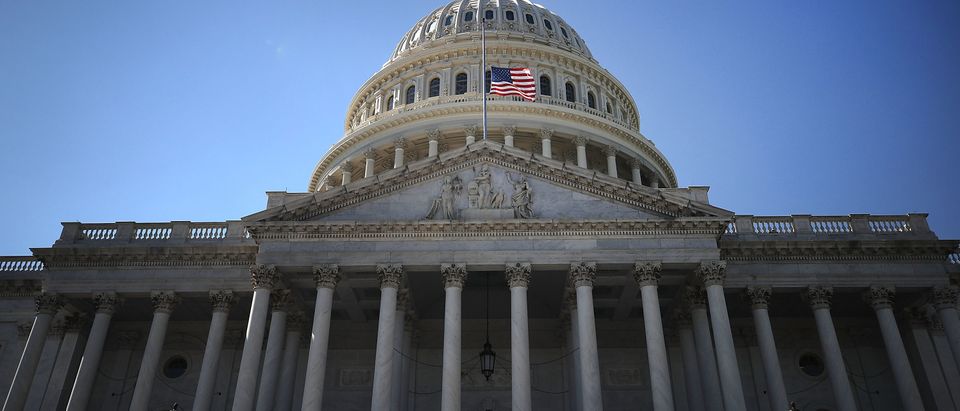The Trump administration is set to resume annual budget deficits exceeding $1 trillion. The national debt (the cumulative tally of annual deficits) now exceeds $22 trillion. Our debt-to-GDP ratio will soon reach a level not seen since World War II. Deficit scolds have bemoaned this situation for years, while the problem only worsens.
Today’s U.S. debt and deficit trajectories are unsustainable. As the late Herbert Stein, head of President Nixon’s Council of Economic Advisers, once said: if something is unsustainable, it will stop.
But when?
Most economists advise that when a business cycle nears its peak, it’s important to establish the monetary- and fiscal-policy reserves that will be needed when the economy again heads south. As will inevitably happen. Those naïve optimists who believe that business cycles have been repealed and that interest rates will remain low forever will experience a major shock.
Monetary and fiscal policies are more constrained now than perhaps at any other time in U.S. history: interest rates are barely above zero (or even negative, when adjusted for inflation), and fiscal policy can only provide more stimulus by increasing our annual deficits and national debt.
Washington is famous for its policy kabuki games. Take tort reform. For decades, lawmakers have been proposing and opposing legal-system reforms. Nothing happens, except that Democratic and Republican lawmakers have found ways to extract campaign cash from interest groups on both sides of the issue. A cynic might conclude that the desired action is really inaction.
The late Peter G. Peterson, Nixon’s Commerce Secretary and co-founder of the Blackstone Group (the world’s largest private-equity firm), spent decades warning about unsustainable budget deficits and the national debt. When Blackstone went public in 2008, Peterson took a billion dollars and established the Peter G. Peterson Foundation, whose purpose is to engage the public and its leaders in solving long-term fiscal challenges.
Nonprofit policy organizations such as the Concord Coalition (which Peterson co-founded in 1992 with the late Sens. Warren Rudman and Paul Tsongas) and the Committee for a Responsible Federal Budget have been providing policy backgrounders and conferences about dangerously rising debt and deficits. Their analyses and recommendations are outstanding, but their messages go unheeded as our fiscal health steadily declines. The White House doesn’t care, and many Democratic presidential candidates are embracing fiscally irresponsible giveaways.
To address this situation successfully and to buttress the efforts of the economists and budget-policy experts, perhaps we should seek help from the psychiatric profession. After all, humans are hard-wired to seek instant gratification. Long-term, delayed gratification has always been a challenge. Moreover, as former Nebraska Sen. Bob Kerry said at the recent Concord Coalition annual gathering, elected officials much prefer receiving adulation; they find it difficult to give bad news to their constituents.
Can we reframe these issues in ways that will actually produce change? One former GOP congressman recently suggested enlisting Madison Avenue-type advertising firms, but these firms are the very prophets of short-term thinking and impulse consumption. Can such talents be rechanneled to inspire the public and our leaders to action?
Washington’s echo chamber today is filled with policy organizations, advocacy groups, think tanks, lobbying firms, consultants and others in the “ideas industry.” These organizations sponsor forums galore on how to fix what ails us, but rarely do these efforts bear tangible fruit. Good money can be made just railing against the status quo.
If we’re serious about change, then perhaps it’s time to consult some unusual suspects, like mental health professionals who understand the dynamics of addressing short-termism. Are there experts in the psychiatric profession who can help us frame compelling messages to overcome our hard-wired tendencies toward “present bias”?
There’s a similar challenge with long-term decision-making in addressing climate change. But when it comes to our looming debt and deficit disasters, we’re likely to experience a major, catastrophic economic collapse well before Miami is submerged.
Policy advocates: let’s bring in the shrinks. Many psychiatrists are skilled at counseling people with obsessive compulsive disorder, which might help explain our obsessive consumer culture that has now produced not only massive government debt, but unsustainable levels of corporate debt, personal debt, student loan debt, and automobile debt.
We have a national debt obsession. It’s compulsive and seemingly incurable. The policy advocates and the politicians face gridlock. The solutions are clear, but the national will is lacking. Perhaps it’s time to supplement our Ph.D.s with a few experienced M.D.s who can help restore the patient to fiscal sanity.
Charles Kolb was deputy assistant to the president for domestic policy in the George H.W. Bush White House from 1990-1992. From 1997-2012, he was president of the nonpartisan, business-led think tank, the Committee for Economic Development.
The views and opinions expressed in this commentary are those of the author and do not reflect the official position of The Daily Caller.


